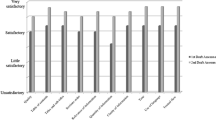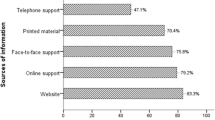Abstract
The aim of this study was to develop an evidence-based psychosocial information booklet for parents of children without a specific diagnosis, many of whom are seen through the genetic clinic. A mixed methods approach was adopted involving four phases. The first two phases involving a systematic review and in-depth interviews are summarised briefly but reported in detail elsewhere. Phase 3 comprised: (1) a grey literature search to identify relevant literature and resources from other patient organizations; (2) drafting the booklet using themes identified through the previous phases; (3) piloting the booklet with eight professional and support group stakeholders and (4) piloting the booklet with 14 parents (from Phase 2) to ensure the information reflected their experiences. In Phase 4, we assessed satisfaction with the booklet through a questionnaire completed by 38 parents. The booklet was well accepted. The importance of providing the booklet at the beginning of the parental ‘journey’ was identified. We have developed an evidence-based information booklet to support parents via a rigorous mixed methods approach. This booklet meets a largely unmet psychosocial need and could be used in practice to support parents of children without a diagnosis.
Similar content being viewed by others
References
Ali-Khan, S. E., Daar, A. S., Shuman, C., Ray, P. N., & Scherer, S. W. (2009). Whole genome scanning: resolving clinical diagnosis and management amidst complex data. Pediatric Research, 66(4), 357–363.
Appleton, S., Garcia-Minaur, S., Porteous, M., Campbell, J., Anderson, E., Watson, M., et al. (2004). The development of a psychoeducational intervention for women living with an increased risk of breast cancer. Patient Education and Counseling, 55(1), 99–104.
Arain, M., Campbell, M. J., Cooper, C. L., & Lancaster, G. A. (2010). What is a pilot or feasibility study? A review of current practice and editorial policy. BMC Medical Research Methodology, 10, 67.
Austoker, J., & Ong, G. (1994). Written information needs of women who are recalled for further investigation of breast screening: results of a multicentre study. Journal of Medical Screening, 1(4), 238–244.
Barr, O. G., & McConkey, R. (2006). Supporting parents who have a child referred for genetic investigation: the contribution of health visitors. Journal of Advanced Nursing, 54(2), 141–150.
Clayton, E. W., Hannig, V. L., Pfotenhauer, J. P., Parker, R. A., Campbell, P. W., 3rd, & Phillips, J. A., 3rd. (1995). Teaching about cystic fibrosis carrier screening by using written and video information. American Journal of Human Genetics, 57(1), 171–181.
Cohen, M. (1997). The child with multiple birth defects. New York: Oxford University Press.
Contact a Family (2005). Living without a diagnosis. www.cafamily.org.uk/pdfs/undiagno.pdf.
Creswell, J. W. (2003). Research design: qualitative, quantitative and mixed methods approaches (2nd ed.). California: Sage.
Daily, D. K., Ardinger, H. H., & Holmes, G. E. (2000). Identification and evaluation of mental retardation. American Family Physician, 61(4), 1059–1067. 1070.
Daly, J., Kellehear, A., & Gliksman, M. (1997). The public health researcher: A methodological approach. Melbourne: Oxford University Press.
Dehkordi, A. H., & Heydarnejad, M. S. (2008). Effect of booklet and combined method on parents’ awareness of children with beta-thalassemia major disorder. The Journal of the Pakistan Medical Association, 58(9), 485–487.
Department of Education. www.education.gov.uk/childrenandyoungpeople/sen/earlysupport. Accessed 23 September 2011.
Early Support (2007). Information for parents; When your child has no diagnosis. www.education.gov.uk/publications/eOrderingDownload/ES16-2010.pdf.
Flesch, R. (1948). A new readability yardstick. Journal of Applied Psychology, 32(3), 221–233.
Gilbert, L., El-Bassel, N., Terlikbayeva, A., Rozental, Y., Chang, M., Brisson, A., et al. (2010). Couple-based HIV prevention for injecting drug users in kazakhstan: a pilot intervention study. Journal of Prevention & Intervention in the Community, 38(2), 162–176.
Glazier, R., Goel, V., Holzapfel, S., Summers, A., Pugh, P., & Yeung, M. (1997). Written patient information about triple-marker screening: a randomized, controlled trial. Obstetrics and Gynecology, 90(5), 769–774.
Graungaard, A. H., & Skov, L. (2006). Why do we need a diagnosis? A qualitative study of parents’ experiences, coping and needs, when the newborn child is severely disabled. Child: Care, Health and Development, 33(3), 296–307.
Hodgson, S. V. (1998). The genetics of learning disabilities. Developmental Medicine and Child Neurology, 40(2), 137–140.
Jefford, M., Gibbs, A., & Reading, D. (2005). Development and evaluation of an information booklet/decision-making guide for patients with colorectal cancer considering therapy in addition to surgery. European Journal of Cancer Care, 14(1), 16–27.
Jones, R., Pearson, J., McGregor, S., Cawsey, A. J., Barrett, A., Craig, N., et al. (1999). Randomised trial of personalised computer based information for cancer patients. British Medical Journal, 319(7219), 1241–1247.
Jones, R. B., Atkinson, J. M., Coia, D. A., Paterson, L., Morton, A. R., McKenna, K., et al. (2001). Randomised trial of personalised computer based information for patients with schizophrenia. British Medical Journal, 322(7290), 835–840.
Jones, R. B., Pearson, J., Cawsey, A. J., Bental, D., Barrett, A., White, J., et al. (2006). Effect of different forms of information produced for cancer patients on their use of the information, social support, and anxiety: randomised trial. British Medical Journal, 332(7547), 942–948.
Lewis, C., Skirton, H., & Jones, R. (2010). Living without a diagnosis: the parental experience. Genetic Testing and Molecular Biomarkers, 14(6), 807–815.
Loeben, G. L., Marteau, T. M., & Wilfond, B. S. (1998). Mixed messages: presentation of information in cystic fibrosis-screening pamphlets. American Journal of Human Genetics, 63(4), 1181–1189.
Mancini, J., Nogues, C., Adenis, C., Berthet, P., Bonadona, V., Chompret, A., et al. (2006). Impact of an information booklet on satisfaction and decision-making about BRCA genetic testing. European Journal of Cancer, 42(7), 871–881.
Mencap. www.mencap.org.uk
Miller, D. T., Adam, M. P., Aradhya, S., Biesecker, L. G., Brothman, A. R., Carter, N. P., et al. (2010). Consensus statement: chromosomal microarray is a first-tier clinical diagnostic test for individuals with developmental disabilities or congenital anomalies. American Journal of Human Genetics, 86(5), 749–764.
Mumsnet. www.mumsnet.com. Accessed 23 September 2011.
Murray, J., Cuckle, H., Sehmi, I., Wilson, C., & Ellis, A. (2001). Quality of written information used in Down syndrome screening. Prenatal Diagnosis, 21(2), 138–142.
Nanton, V., Docherty, A., Meystre, C., & Dale, J. (2009). Finding a pathway: information and uncertainty along the prostate cancer patient journey. British Journal of Health Psychology, 14(Pt 3), 437–458.
National Health Service (2003). Toolkit for producing patient information. http://www.dh.gov.uk/en/Publicationsandstatistics/Publications/PublicationsPolicyAndGuidance/DH_407014123 September 2011.
Nicklin, J. (2009). Gastrointestinal cancer: developing an information booklet for patients. Nursing Standard, 23(33), 35–40.
O’Cathain, A., & Thomas, K. (2006). Combining qualitative and quantative methods. In C. Pope & N. Mays (Eds.), Qualitative research in health care. Oxford: Blackwell Publishing; BMJ Books.
Paul, F., Hendry, C., & Cabrelli, L. (2004). Meeting patient and relatives’ information needs upon transfer from an intensive care unit: the development and evaluation of an information booklet. Journal of Clinical Nursing, 13(3), 396–405.
Pelsser, L. M., Frankena, K., Buitelaar, J. K., & Rommelse, N. N. (2010). Effects of food on physical and sleep complaints in children with ADHD: a randomised controlled pilot study. European Journal of Pediatrics.
Plain English Campaign How to write in plain English. http://www.plainenglish.co.uk/files/howto.pdf. Accessed 26 April 2011.
Pothier, L., Day, R., Harris, C., & Pothier, D. D. (2008). Readability statistics of patient information leaflets in a Speech and Language Therapy Department. International Journal of Language & Communication Disorders, 43(6), 712–722. doi:10.1080/13682820701726647.
Rosenthal, E. T., Biesecker, L. G., & Biesecker, B. B. (2001). Parental attitudes toward a diagnosis in children with unidentified multiple congenital anomaly syndromes. American Journal of Medical Genetics, 103(2), 106–114.
Roshanai, A. H., Rosenquist, R., Lampic, C., & Nordin, K. (2009). Does enhanced information at cancer genetic counseling improve counselees’ knowledge, risk perception, satisfaction and negotiation of information to at-risk relatives?–a randomized study. Acta Oncologica, 48(7), 999–1009.
Satterlund, M. J., McCaul, K. D., & Sandgren, A. K. (2003). Information gathering over time by breast cancer patients. Journal of Medical Internet Research, 5(3), e15.
Skirton, H., & Eiser, C. (2003). Discovering and addressing the client’s lay construct of genetic disease: an important aspect of genetic healthcare. Research and Theory for Nursing Practice, 17(4), 339–352.
Strauss, A. L., & Corbin, J. (1998). Basics of qualitative research: Techniques and procedures for developing Grounded Theory (2nd ed.). Thousand Oaks: Sage.
Syndromes Without A Name USA. www.undiagnosed-usa.org/.
Syndromes Without A Name. www.undiagnosed.org.uk/.
Trask, C. L., Welch, J. J., Manley, P., Jelalian, E., & Schwartz, C. L. (2009). Parental needs for information related to neurocognitive late effects from pediatric cancer and its treatment. Pediatric Blood & Cancer, 52(2), 273–279.
Unique. www.rarechromo.org/.
Vadaparampil, S. T., Quinn, G. P., Gjyshi, A., & Pal, T. (2011). Development of a brochure for increasing awareness of inherited breast cancer in black women. Genetic Testing and Molecular Biomarkers, 15(1–2), 59–67.
Acknowledgments
We are extremely grateful to all the parents who allowed us to interview them during this study and who contributed to the development of the information booklet. We would also like to thank Chris Barnes, Dr Simon Holden, Dr Emma McGibbon, Beverley Searle, Liz Swingwood, Sally Watts, the Health Visiting Union (CPHVA) and Mencap UK for their contributions.
Author information
Authors and Affiliations
Corresponding author
Rights and permissions
About this article
Cite this article
Lewis, C., Skirton, H. & Jones, R. Development of an Evidence-Based Information Booklet to Support Parents of Children Without a Diagnosis. J Genet Counsel 21, 854–861 (2012). https://doi.org/10.1007/s10897-012-9501-2
Received:
Accepted:
Published:
Issue Date:
DOI: https://doi.org/10.1007/s10897-012-9501-2




